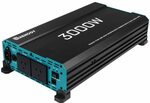Please click on the coupon to place the order on Amazon
RENOGY 3000W 12V PURE SINE WAVE INVERTER
Input Voltage: 12VDC
Continuous Power: 3000W
Surge Power: 6000W
Output Voltage: 230VAC±10
Output Frequency (Nominal): 50Hz±0.3
Output Wave form:Pure Sine Wave
Static Current: 1.3A
Input Voltage Range: 11-16Vdc
Low Voltage Shutdown: 10Vdc
Recover from low voltage protection
Battery supply & AC main transfer time within 50ms
High Voltage Shutdown: 16.3Vdc
Dimensions: 48222092mm
Weight: 6.4Kg
Certifications:
CE YES
EMC YES
The perfect addition to any off-grid system, whether for a van or a cabin, the Renogy 3000W Pure Sine Wave Power Inverter acts as a DC to AC converter that allows you to power your household appliances. Unlike modified sine wave inverters, this 3000W inverter is a pure sine wave, capable of producing cleaner, smoother, and more reliable electricity to operate tools, fans, lights, and other electronics without interference. Many off-grid systems require a 12V solar inverter to power everyday electronics and this one includes multiple protections to help things run smoothly and safely.
The AC priority switch function enables the inverter automatically switch from the battery (DC) to the mains (AC) and vice-vercer whenever the utility company takes/loses power!
Safe
Electronic overload protection with automatic shutdown.
Built-in internal backup DC fuse provides added safety.
Low battery voltage protection with automatic shutdown.
Over temperature protection with automatic shutdown.
Output short circut protection.
UPS (AC priority switch) function: Transfers input power between battery supply & AC main within 50mS



 CamelCamelCamel
CamelCamelCamel

Can this be mounted vertically?